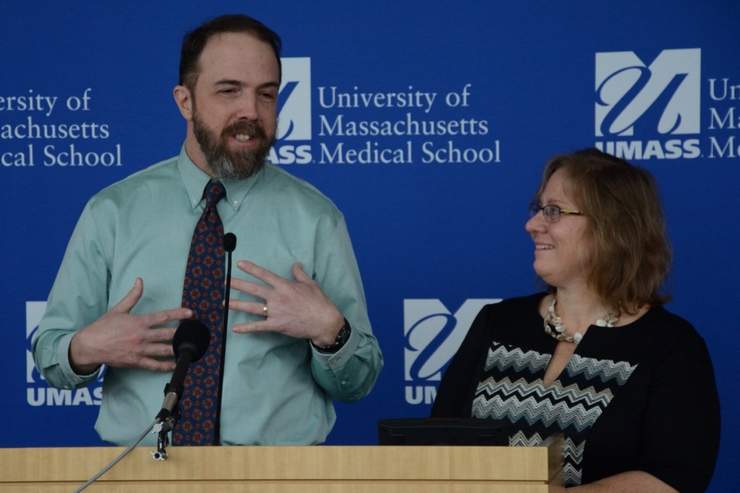
Dr. Rick Sacra, a Christian doctor who recovered from Ebola last fall announced today that he is returning to West Africa this week "to show the love and compassion of Jesus" to those who continue to suffer from the deadly virus.
Last year, Dr. Sacra, 52, made headlines as the third health care worker to both contract and survive Ebola. He was diagnosed with the virus while working as a missionary physician at ELWA hospital outside Monrovia, Liberia's capital, and one of the areas hardest hit by the deadly epidemic that has claimed thousands of lives.
Although discharged from Nebraska Medical Center Ebola-free in late September, he was later re-admitted with an upper respiratory infection with a complication called uveitis, or swelling of the eye.
"I've had a few bumps in the road, but God provided through it all...today, I'm 95% better," the Holden resident and family physician said today during a press conference at the University of Massachusetts Medical School.
On January 15, Dr. Sacra will be the first American to return to Liberia after recovering from the disease, and will once again work at the ELWA hospital. The physician said that his family, including his wife, Debbie, who stood next to him during the press conference, was supportive of his decision to go back to Africa.
"I don't think we had any trouble saying yes," said Debbie.
Although experts believe he is now immune to the disease, the doctor says he is unlikely to ever work directly in an Ebola unit.
"Right now in Monrovia there's probably more preventable mortality from diseases other than Ebola, because people aren't getting treated for Malaria, for other infections, for Appendicitis," he said. "Other facilities are closed or limping along. I think it makes more of a difference for me to put in my efforts at the hospital."
He added that he will wear the same type of protective equipment that other healthcare workers are advised to use to prevent transmission of Ebola.
"I will still behave as if I were not immune to Ebola," Dr. Sacra said. "I've been a doctor there for so long, I'm looked up to there as a model of how to behave in the hospital. Even when I'm not trying to be a trainer, I'm a trainer by example. So I need to be a good example of how to prevent Ebola to my staff."
When asked what motivated him to return to an environment which nearly claimed his life, Dr. Sacra cited his strong Christian faith.
"When Jesus was on this earth he traveled around to visit people who were lost, forgotten and suffering," he said. "He made it his business to accept them, love them and heal them, and he asked us to the do the same. That's very personal and very real for me."
While Liberia is currently "in the best shape" of all the countries hit with Ebola epidemic, Dr. Sacra warned the international community against "complacency" regarding the health care situation in West Africa.
"We must not rest until there are zero cases of Ebola, and we must not rest until the medical field is equipped to contain the next outbreak," Dr. Sacra emphasized, "If we don't continue to be very strategic about strengthening the health system here, then they'll be vulnerable to another epidemic...whether it's Ebola, or another kind of disease."
In the meantime, the physician says he is excited to return to Liberia to do the Lord's work--something he believes he is called to do.
"I am excited to join a team of real servants who constantly take a great risk to show the love and compassion of Jesus every day," he said.














